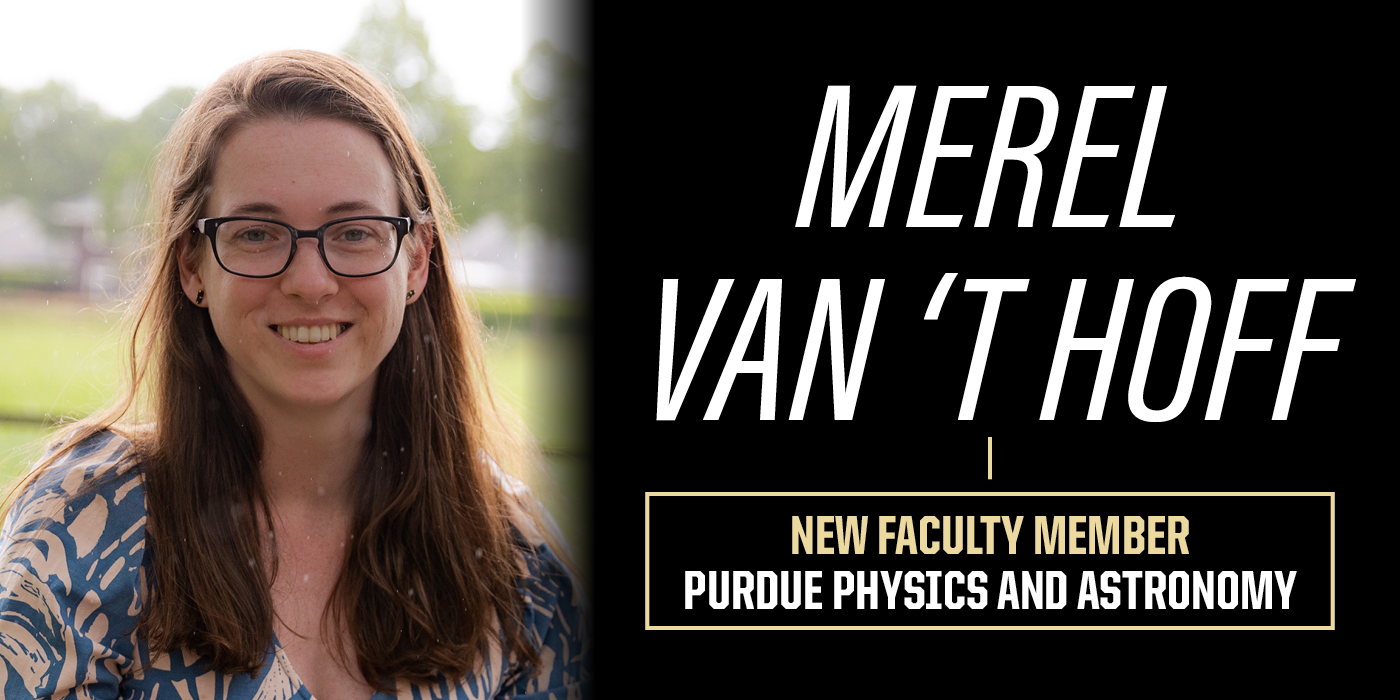Merel van ‘t Hoff joins the faculty of the Department of Physics and Astronomy at Purdue University
2024-11-26

The Department of Physics and Astronomy at Purdue University welcomes a new member to the faculty, Merel van ‘t Hoff, as Assistant Professor, starting fall semester 2024.
Prof. van ‘t Hoff is an expert in astrophysics, astrochemistry, and astronomy. Her research aims to understand how planets form and how prevalent planets like Earth might be in the Milky Way and other galaxies.
Prior to joining Purdue, Prof. van ‘t Hoff was a postdoctoral researcher in the Michigan Society of Fellows at the University of Michigan, collaborating with Edwin Bergin. She received her Ph.D. from Leiden University in the Netherlands in astronomy and astrophysics, where she studied with Ewine van Dishoeck on the astrochemistry of planet formation. She earned bachelor and master degrees in life science and technology, and astrophysics, also from Leiden University.
“I study the environments in which planets form: disks of gas and dust around newly born stars," she says. "I use observations of molecules obtained with state-of-the-art telescopes such as ALMA and JWST to unravel the chemical composition of the planetary building blocks as well as to constrain the physical conditions that control how planets form. By establishing how common or rare the conditions are that led to the formation of our own Solar System and Earth, we will be able to predict how likely it is to find a planet like Earth around stars other than the Sun.”
Prof. van ‘t Hoff’s passion for teaching dates to her early childhood, where she set up a small chalkboard in her family’s home to teach her younger siblings what she had learned in school.
“As an instructor I strive to make my classes interesting, engaging and an environment where everyone can grow and succeed," she says. "I believe that making students feel that they belong in the classroom and the field is of paramount importance to their success, and that I as a teacher can help facilitate this by not only discussing course material but also the human aspect behind it. For example, by sharing personal experiences and highlighting contributions from scientists with underrepresented identities.”
Prof. van ‘t Hoff will teach Astronomy 364: Stars and Galaxies, in the upcoming spring semester. The class is calculus-based content for science and engineering majors.
In her free time, Prof. van ‘t Hoff enjoys nature photography and goldsmithing.
About the Department of Physics and Astronomy at Purdue University
Purdue Department of Physics and Astronomy has a rich and long history dating back to 1904. Our faculty and students are exploring nature at all length scales, from the subatomic to the macroscopic and everything in between. With an excellent and diverse community of faculty, postdocs, and students who are pushing new scientific frontiers, we offer a dynamic learning environment, an inclusive research community, and an engaging network of scholars.
Physics and Astronomy is one of the seven departments within the Purdue University College of Science. World-class research is performed in astrophysics, atomic and molecular optics, accelerator mass spectrometry, biophysics, condensed matter physics, quantum information science, particle and nuclear physics. Our state-of-the-art facilities are in the Physics Building, but our researchers also engage in interdisciplinary work at Discovery Park District at Purdue, particularly the Birck Nanotechnology Center and the Bindley Bioscience Center. We also participate in global research including at the Large Hadron Collider at CERN, many national laboratories (such as Argonne National Laboratory, Brookhaven National Laboratory, Fermilab, Oak Ridge National Laboratory, the Stanford Linear Accelerator, etc.), the James Webb Space Telescope, and several observatories around the world.
Written by Andrew Robison, assistant department head of Purdue Physics and Astronomy